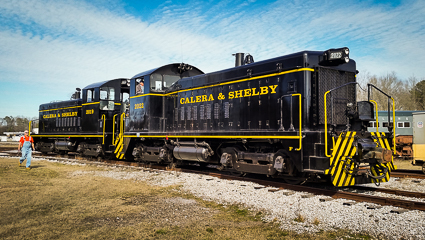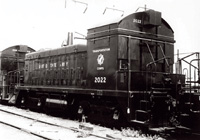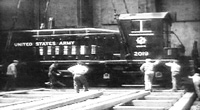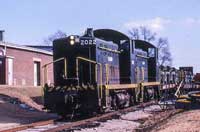
Locomotive's 2019 & 2022 configured for MU operation.
Electro-Motive Division (EMD) SW8 Switch engines No. 2019 and 2022 were built in 1951. They are powered by a 8-Cylinder 567 engine producing 800 horsepower. They have an overall length of 44’5” from coupler to coupler and have a fully loaded weight of 230,000 pounds. The SW8 was considered the medium horsepower switching locomotive in EMD’s catalog. 2019 and 2022 were 2 of 41 locomotives ordered by the U. S. Army. This order was the largest ever for SW8s from any purchaser. Carrying road Nos. 2000 through 2040 they were constructed between May and June, 1951 at EMD’s plan No. 3 in Cleveland Ohio.
U. S. Army Veterans
Not only do No. 2019 and No. 2022 provide the motive power for the trains of the Calera & Shelby Railroad, they are also U. S. Army veterans who saw service in Korea from 1951 to 1953. With the invasion of South Korea by North Korea, the United States, along with its United Nations partners, quickly began to ship men and supplies to halt the communist advance.
Korean National Railroad is Born

Locomotive No. 2022 and sisters prepared for shipment.
from the Alan Dismukes Collection
Rail transportation proved to be a vital component during the conflict. The Japanese had built the Korean rail system after having annexed Korea. This was done in support of Japan’s invasion of Manchuria. Interestingly, the Japanese built the system to the standards of the American railroad industry, utilizing standard gauge and knuckle couplers. The Korean government assumed control of the system under the name, Korean National Railroad (KNR) at the end of WWII.
Army Makes Plans
Throughout the Korean conflict, the U. S. Army depended heavily on the KNR for movement of men and supplies from the harbor at Pusan to the scene of the fighting. At the time of the invasion, the KNR had about 300 serviceable steam engines and some 6,000 cars. During the first year of the war, it became clear that the steam locomotives and equipment left behind by the Japanese were being stretched too thin to support the U. S. military’s needs. The Army made plans to purchase new diesel locomotives for use in Korea.
Largest Order of SW8s

No. 2019 lowered into a ship's hold in New York, bound for Korea in 1951.
View taken from a United States Army Transportation Corp film.
The U. S. Army’s order for 41 SW8 was the largest order for SW8s from any purchaser, more than any Class 1 railroad. After construction, they were loaded aboard ship in New York Harbor for the trip through the Panama Canal to Pusan, Korea. When the diesels arrived in Korea, railroad operations were being conducted by the 712th and 724th Transportation Railway Operating Battalions under the direction of the 3rd Military Railway Service of the United States Army. Once the diesels arrived, the usual practice was for the SW8s to be operated by two American soldiers with a Korean pilot. Trains carried men, ammunition, and supplies. Hospital trains loaded with wounded personnel ran regularly from the front to the harbor at Pusan.
Re-built, Retired, and Re-Born

No. 2022 and No. 2019 doublehead a trainload of HMMWVs at Ft. Campbell, KY on January 9, 1990.
from Clifford Downey Collection
As the fighting wound down and a cease-fire was put into effect, the Army shipped most of the diesels back to the United States in 1953. Some of the SW8s remained behind and continue in KNR service today. No. 2019 was sent back to EMD for reconditioning in September 1953, and No. 2022 was rebuilt in June of 1955. Both engines along with their sisters saw service at military bases in the states until being retired in the early 1990s. No. 2019 and 2022 finished out their service careers at Ft. Campbell, Kentucky and were acquired through government surplus by the Heart of Dixie Railroad Museum in 1995.
 |
|
Type and origin |
|
| Power type | Diesel-electric |
| Builder | General Motors Electro-Motive Division General Motors Diesel (GMD, Canada) |
| Model | SW8 |
| Build date | September 1950 – February 1954 |
| Total produced | 374 |
Specifications |
|
| Gauge | 4 ft 8 1⁄2 in (1,435 mm) standard gauge |
| Prime mover | EMD 567B |
| Engine type | Two-stroke diesel |
| Aspiration | Roots-type supercharger |
| Cylinders | 8 |


